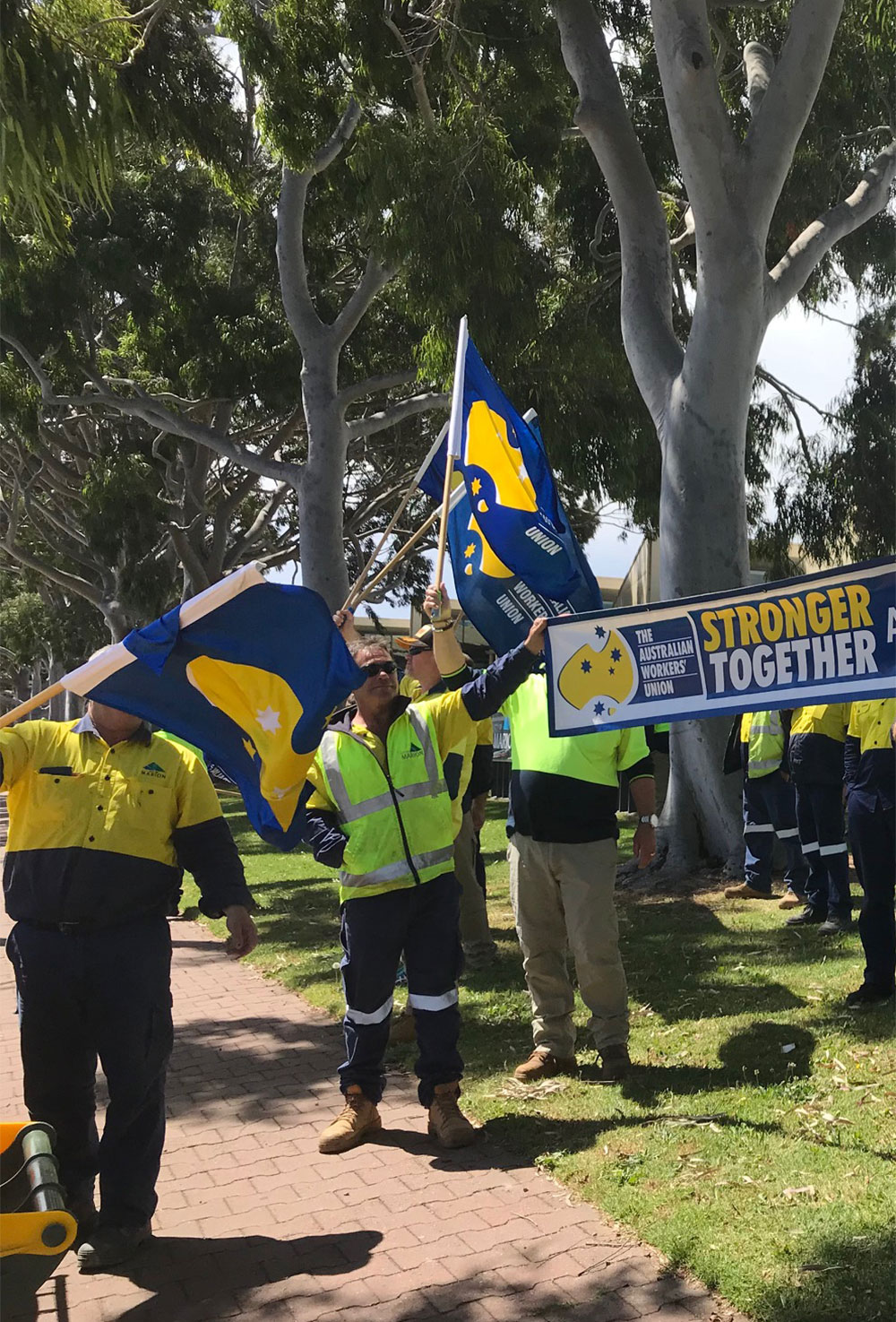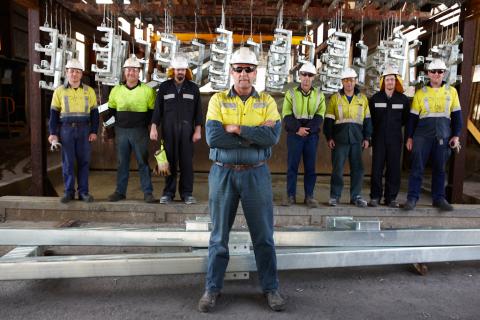As part of your entitlements as a member of the Australian Workers’ Union in South Australia, you will be provided with advice and assistance, at no cost, in making an Unfair Dismissal Application.
As with all areas where we represent individual members, we regard the application as your application. It is therefore our task to put strongly your side of the story as you would have it told. It is you, the member, who is the important person. While we are involved in your application we take our instructions from you. No agreements are made without the explicit consent of the member.
THE UNFAIR DISMISSAL PROCESS
If you feel that you may have been unfairly dismissed, the first step is to contact your Representative. They may be able to sort out the problem without seeking the assistance of an Industrial Commission.
If that is not possible, the Unfair Dismissal application (summons) will be filed on your behalf. This must be done within 21 days of the dismissal. In some circumstances extensions of time may be obtained. An attempt to negotiate with the employer will be made after the summons is filed.
When the summons is filed, a date is set for a Conciliation Conference. The purposes of Conciliation are to help the parties reach agreement, to produce an assessment of the merits of the case and a recommendation about what should happen. Neither the assessment and recommendation, nor anything else said or done at the Conciliation can be used in a trial on the merits of the application.
The Conciliation Conference can, however, be referred to in a costs application. Until 14 days after the Conciliation Conference there is no risk of a costs order. After that time if the worker loses or withdraws before the conclusion of the trial, or is successful and receives the same or less than an offer made by the employer, the employer may apply to have the worker pay their legal costs. The worker will have to pay the employer’s legal costs if they are found to be unreasonable.
Generally speaking, the AWU will represent you at the Conciliation Conference and advise you on the assessment and recommendation.
Assessment on whether the AWU will represent you at a trial will be made on each application. Careful attention will be given to the circumstances of each particular matter. Conducting a trial requires a huge amount of resources and you may be asked to make a commitment of resources also.
It is required that you accept our reasonable advice for the AWU to continue to represent you. At any stage you are free to take advantage of your membership entitlement of a first free interview with a solicitor for a second opinion. These are the general rules of the AWU’s representation of members in Unfair Dismissal matters. Every matter will be individually assessed.
Please contact your Representative if you wish to discuss these issues in more detail.
Enterprise Bargaining Agreements (EBA’S) are agreements reached between employees and employers about working conditions.
Statistics from the Australian Bureau of Statistics and the Awards and Agreements Database and Monitor maintained by the Australian Centre for Industrial Relations Research and Training clearly show that EBA’s without Union involvement leave the employees worse off.
Generally speaking, for an EBA to be legally enforceable it must be registered with either the Australian Industrial Relations Commission or the South Australian Industrial Relations Commission. When an Award and an EBA apply to a workplace, usually the EBA prevails where there is any inconsistency between the two.
Often employers want employees to give up many of the benefits that they have in exchange for an increase in their base rate of pay. Employees need to carefully consider proposals like that, as benefits that were originally gained through hard struggle and given up, are rarely regained.
If you don’t have an EBA at your workplace, please contact your Representative to discuss the issue.
The Australian Workers’ Union also offers training in negotiating EBA’s.
For more information contact us on (08) 8360 1900

Awards are legally enforceable documents that govern terms and conditions of employment. There are two basis types of Awards Federal Awards and State Awards. Awards are the decisions of the relevant Industrial Commission they are like a court case that is never finished, with Unions always fighting to improve them in the face of opposition from employer groups.
It is important to understand that Awards are not simply given by Industrial Commissions or the Government, they have to be fought for by Unions. Workers who are not Union members are free loading off the contribution of Union Members.

FEDERAL AWARDS
Federal Awards apply to all workplaces or businesses that are ‘respondents’ to the relevant Award. The ‘respondents’ to a Federal Award are usually listed at the back of the Award. Where there is a Federal Award that applies to a business that would otherwise be covered by a State Award, the fact that the Federal Award applies means that the State Award does not. The Liberal Government’s Workplace Relations Act has significantly reduced the rights that workers have under Federal Awards.
STATE AWARDS
State Awards are usually ‘common rule’ Awards that means that they apply to all workplaces in the industry covered by the Award that are not covered by Federal Awards. Both State and Federal Awards form an important safety net not only for workers who cannot negotiate Enterprise Bargaining Agreements, but also as a floor for workers who can negotiate Enterprise Bargaining Agreements.
If you want any more information about Awards, or to find what Award (if any) covers you, please contact your Representative.
When employees, their Union and an employer cannot agree about something in the workplace,
it can be described as an Industrial Dispute. In many cases the
parties are able to resolve Industrial Disputes between themselves.
Sometimes it becomes necessary to seek the assistance of an Industrial Commission. In the first instance, an Industrial Commission will attempt to conciliate a dispute. That means that they try to help the parties reach an agreement between themselves. If that is unsuccessful, the Commission may arbitrate the dispute. That means that the Commission hears evidence about what has happened and makes a decision about how the dispute will be resolved. In many cases the decision will be binding on both parties.
In many cases the dispute will be about whether employees or the employer have complied with a term
of an Enterprise Bargaining Agreement or an Award. Commonly, disputes of this nature involve compliance with dispute resolution procedures, discipline and grievance procedures, the appropriate classification to be applied to a worker and the use of workers who are not full time permanent employees of the employer.
If there is something happening at your workplace that you are concerned about, please contact your Representative to discuss the issue.
All employees have contracts of employment. For many employees, these simply reflect how their employment relates to relevant Award or Enterprise Bargaining Agreements e.g. whether they are casual, permanent part time or full time. Employment contracts can also incorporate things over and above the entitlements in an Award or Enterprise Bargaining Agreement.
However, in South Australia unless:
– the contract is registered Australian Workplace Agreement; or
– is made under a facilitate provision in an Enterprise Bargaining Agreement or Award
no contract can reduce the terms and conditions of an employee under an Enterprise Bargaining Agreement or Award.
For more information about contracts of employment, please contact your Representative.
Basically, AWA’s are individual contracts of employment approved by the Federal Government’s Employment Advocate.
Unlike Awards and Enterprise Bargaining Agreements, in the vast majority of cases, AWA’s are not examined by the ‘independent umpire’ that is the Industrial Relations Commission.
AWA’s can be used by employers to replace Enterprise Bargaining Agreements and have the ability to override Federal and State Awards.
If your employer, or anywhere you apply for work, ask you to sign an AWA contact your Representative immediately.
Awards, Enterprise Bargaining Agreements and the vast majority of Industrial and Workers Compensation law only apply to employees. Just because someone you work for tells you that you are ‘a contractor’ and not an employee, does not mean that it is necessarily true.
You could be an employee even if you have signed documents that say you are not an employee.
There are many factors that determine whether someone is an employee or not, and all of the circumstances are taken into account. One of the most important factors is the amount of control that the ’employer’ exercises over the ’employee’.
If any doubt contact your Representative to get detailed advice on your particular situation.


